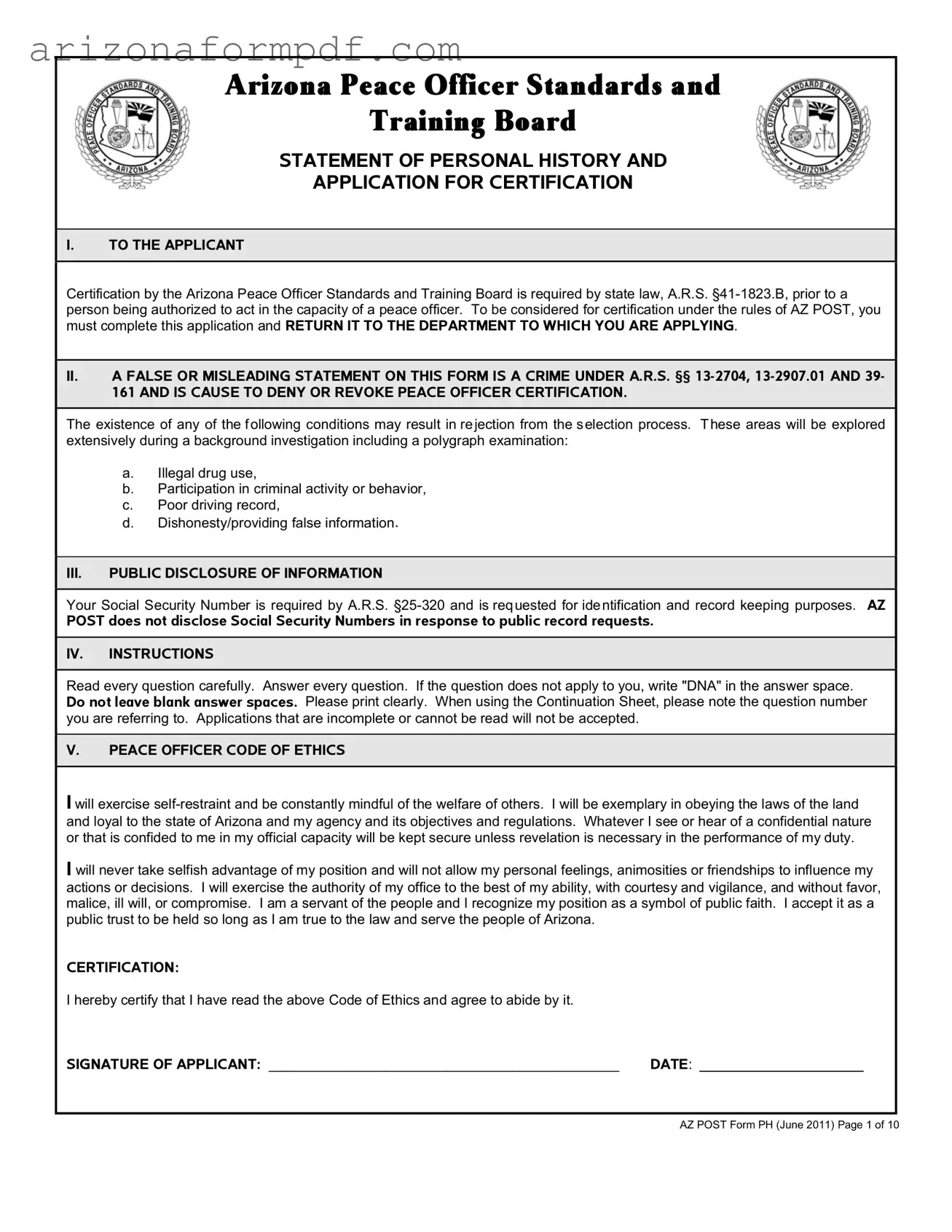Fill Out Your Az Post Form
The Arizona Peace Officer Standards and Training Board (AZ POST) form is a crucial document for individuals aspiring to become certified peace officers in the state of Arizona. This application requires detailed personal history information, which serves as a foundation for evaluating an applicant's eligibility for certification. Key components of the form include a thorough disclosure of personal background, such as employment history, educational qualifications, and military service, if applicable. Additionally, applicants must provide personal references who can vouch for their character and conduct. Importantly, the form emphasizes the necessity of honesty; any false or misleading information can lead to serious legal consequences and disqualification from the certification process. The application also contains a Code of Ethics, which outlines the expected conduct of peace officers and reinforces their commitment to public trust. Furthermore, applicants are informed about the public disclosure of their information, including the requirement to provide a Social Security number for identification purposes, while ensuring that such sensitive information remains protected from public records requests. Completing this form accurately and thoroughly is essential, as any omissions or inaccuracies may result in rejection from the selection process.
Guide to Writing Az Post
Filling out the AZ POST form is an important step in your journey to becoming a certified peace officer in Arizona. This form requires detailed personal information, and accuracy is crucial. Incomplete or unclear applications can lead to delays or even rejection. Follow these steps carefully to ensure that your application is complete and correctly filled out.
- Begin with your name. Write your last name, first name, and middle name in the designated fields.
- Provide your address. Include the street address, city, state, and zip code.
- Enter your date of birth in the format of month/day/year.
- Indicate your place of birth by specifying the city and state.
- Fill in your Social Security Number. This is necessary for identification purposes.
- If you have used any other names, dates of birth, or Social Security Numbers, list them in the appropriate section.
- State your current marital status.
- Provide your spouse's name before marriage, if applicable.
- List your home, work, and cell/mobile telephone numbers.
- Confirm your citizenship status by checking the appropriate box. If you are a U.S. citizen, attach a copy of your birth certificate or other verification.
- Indicate whether you have a G.E.D. certificate or high school diploma. Attach a copy of the document.
- If applicable, provide details about your military service. Include the branch of service, dates of entry and separation, and whether you received an honorable discharge.
- List at least three personal references who can vouch for your character, excluding relatives or former employers.
- Document all persons you have lived with in the past five years, excluding family members.
- List your immediate relatives, including parents, siblings, spouse, ex-spouse(s), and children.
- Detail your employment history, starting with your most recent employer. Include dates of employment, employer's name and address, supervisor's name, job title, duties, and reason for leaving.
- List all colleges or universities you have attended, including the name of the institution, dates of attendance, course of study, degree received, and total credit hours.
- Finally, document all residences you have lived in during the past five years.
Once you have completed the form, review it for accuracy and clarity. Ensure that all required documents are attached before submitting it to the appropriate department. This thoroughness will help facilitate the certification process and demonstrate your commitment to becoming a peace officer.
Browse Popular Forms
State Taxes Arizona - Be ready to provide further clarification if the Arizona Department of Revenue requests it.
How to Get a Seller's Permit in Arizona - It is designed for businesses beginning operations in Arizona requiring multiple tax licenses.
Common Questions
What is the purpose of the AZ POST form?
The AZ POST form, officially known as the Statement of Personal History and Application for Certification, is a mandatory document for individuals seeking certification as peace officers in Arizona. This form is required by state law and must be completed and submitted to the appropriate department before a person can be authorized to act in the capacity of a peace officer. It collects essential information about the applicant's background, employment history, and personal conduct to determine their eligibility for certification.
What happens if I provide false information on the AZ POST form?
Providing false or misleading information on the AZ POST form is considered a crime under Arizona law. It can lead to serious consequences, including the denial or revocation of peace officer certification. The application process includes a thorough background investigation, which may involve a polygraph examination to verify the information provided. Therefore, it is crucial to answer all questions truthfully and accurately.
How should I fill out the AZ POST form if a question does not apply to me?
If a question on the AZ POST form does not apply to you, it is important to write "DNA" in the answer space instead of leaving it blank. This ensures that the form is complete and can be processed without issues. Incomplete forms may be rejected, so clarity and thoroughness are essential when filling out the application.
What information is required for the AZ POST form regarding my background?
The AZ POST form requires detailed information about your personal history, including your name, address, date of birth, Social Security Number, and employment history. You will also need to disclose any military service, personal references, and past residences. This information helps assess your suitability for certification as a peace officer and may be subject to verification during the background investigation.
Is my Social Security Number disclosed to the public when I submit the AZ POST form?
No, your Social Security Number is not disclosed to the public when you submit the AZ POST form. According to Arizona law, this information is collected for identification and record-keeping purposes only. AZ POST takes measures to protect your privacy and does not release Social Security Numbers in response to public record requests.
Dos and Don'ts
When filling out the AZ POST form, there are important guidelines to follow. Here is a list of things you should and shouldn't do:
- Do read every question carefully before answering.
- Do answer every question completely. If a question does not apply, write "DNA."
- Do print clearly to ensure your answers are legible.
- Do use the Continuation Sheet if you need more space for your answers.
- Don't leave any blank spaces on the form.
- Don't provide false or misleading information, as this is a crime.
- Don't forget to sign and date the application before submitting it.
- Don't submit incomplete forms, as they will not be accepted.
Similar forms
The AZ POST form shares similarities with the FBI Background Check form. Both documents require individuals to provide detailed personal information to facilitate a thorough background investigation. In both cases, applicants must disclose any criminal history, employment records, and personal references. The FBI Background Check is crucial for various positions, particularly those in law enforcement or sensitive roles, just as the AZ POST form is essential for peace officer certification in Arizona.
Another document that resembles the AZ POST form is the Employment Application. Typically used by employers, this application collects similar personal history, including education, work experience, and references. Both forms emphasize the importance of honesty, as providing false information can lead to serious consequences. The Employment Application often serves as the first step in the hiring process, much like the AZ POST form does for peace officers.
The Military Service Record Request form is also comparable to the AZ POST form. This document is used by individuals seeking to obtain their military records, which often include personal history and service details. Both forms require individuals to provide identifying information, and the military records can be crucial for background checks in law enforcement roles. The integrity of the information provided is paramount in both cases.
Similarly, the State Licensing Application for various professions mirrors the AZ POST form. These applications often require a comprehensive disclosure of personal history, including criminal background and professional conduct. Just as the AZ POST form assesses suitability for peace officer certification, state licensing applications evaluate eligibility for various professional roles, ensuring that applicants meet established ethical and legal standards.
The Personal History Statement used in other law enforcement agencies also shares a close resemblance to the AZ POST form. This document typically requires applicants to disclose their personal, educational, and employment histories, along with any criminal records. Both forms are designed to ensure that candidates meet the necessary qualifications and moral character standards required for law enforcement positions.
The Credit Report Authorization form is another document that has similarities with the AZ POST form. While the AZ POST form focuses on personal history and background checks, the Credit Report Authorization form allows employers to assess an individual's financial responsibility. Both documents require consent for the release of personal information, underscoring the importance of transparency in evaluating a candidate's character and reliability.
Additionally, the Child Protective Services Background Check form aligns with the AZ POST form in its intent to safeguard vulnerable populations. Both documents require detailed personal information and background checks to ensure that individuals do not pose a risk in positions of trust. The thoroughness of these forms reflects the critical nature of the roles they pertain to.
The Professional License Renewal Application is another document similar to the AZ POST form. This application often requires individuals to provide updates on their personal history, including any legal issues that may have arisen since their last renewal. Both forms emphasize the importance of maintaining ethical standards and ensuring that professionals remain fit for their roles.
The State Bar Application for attorneys also bears resemblance to the AZ POST form. This application requires a comprehensive disclosure of personal history, including any criminal history or ethical violations. Both forms are designed to uphold the integrity of their respective professions, ensuring that only those of good moral character are granted certification or licensure.
Finally, the Volunteer Application for organizations that work with vulnerable populations is similar to the AZ POST form. This document typically requires applicants to disclose personal history, references, and any criminal background. Both forms aim to ensure the safety and well-being of those served, emphasizing the importance of trustworthiness and ethical conduct in sensitive roles.
Key takeaways
When filling out and using the AZ POST form, keep the following key points in mind:
- Complete the Form Accurately: Every question must be answered. If a question does not apply, write "DNA" instead of leaving it blank.
- Use Clear Handwriting: Print clearly to ensure all information is legible. Incomplete or unreadable forms will be rejected.
- Be Honest: Providing false information is a crime and can lead to denial or revocation of your peace officer certification.
- Include Required Documentation: Attach necessary documents, such as proof of citizenship or educational qualifications, as specified in the form.
- Prepare for Background Checks: Expect a thorough background investigation, including a polygraph examination, that will explore your history and conduct.
- Understand Public Disclosure: Your information may be subject to public records laws, but your Social Security Number will remain confidential.
- Follow the Code of Ethics: Acknowledge and agree to abide by the Peace Officer Code of Ethics included in the application.
Common mistakes
-
Leaving Questions Blank: One of the most common mistakes is not answering every question. If a question does not apply, simply write "DNA" instead of leaving it blank.
-
Poor Handwriting: Applications that cannot be read due to unclear handwriting will be rejected. Always print clearly to ensure your information is legible.
-
Inaccurate Personal Information: Double-check your name, address, and Social Security Number. Mistakes in these details can lead to significant delays or rejection.
-
Incomplete Employment History: Failing to list all relevant employment can raise red flags. Ensure you provide a complete and accurate account of your work history.
-
Neglecting to Use the Continuation Sheet: If you need more space to explain your answers, use the Continuation Sheet. Not doing so can result in incomplete submissions.
-
Ignoring the Code of Ethics: Applicants must read and agree to the Code of Ethics. Not signing or acknowledging this section can lead to disqualification.
-
Not Providing Required Documentation: Ensure you attach necessary documents, such as proof of citizenship or educational qualifications. Missing documentation can hinder your application.
-
Failure to Follow Submission Instructions: Carefully read and follow all instructions for submission. Not adhering to guidelines can result in your application being rejected.
Document Preview

Arizona Peace Officer Standards and
Training Board
STATEMENT OF PERSONAL HISTORY AND
APPLICATION FOR CERTIFICATION
I.TO THE APPLICANT
Certification by the Arizona Peace Officer Standards and Training Board is required by state law, A.R.S.
II.A FALSE OR MISLEADING STATEMENT ON THIS FORM IS A CRIME UNDER A.R.S. §§
161 AND IS CAUSE TO DENY OR REVOKE PEACE OFFICER CERTIFICATION.
The existence of any of the following conditions may result in rejection from the selection process. These areas will be explored extensively during a background investigation including a polygraph examination:
a.Illegal drug use,
b.Participation in criminal activity or behavior,
c.Poor driving record,
d.Dishonesty/providing false information.
III. PUBLIC DISCLOSURE OF INFORMATION
Your Social Security Number is required by A.R.S.
POST does not disclose Social Security Numbers in response to public record requests.
IV. INSTRUCTIONS
Read every question carefully. Answer every question. If the question does not apply to you, write "DNA" in the answer space. Do not leave blank answer spaces. Please print clearly. When using the Continuation Sheet, please note the question number you are referring to. Applications that are incomplete or cannot be read will not be accepted.
V.PEACE OFFICER CODE OF ETHICS
I will exercise
I will never take selfish advantage of my position and will not allow my personal feelings, animosities or friendships to influence my actions or decisions. I will exercise the authority of my office to the best of my ability, with courtesy and vigilance, and without favor, malice, ill will, or compromise. I am a servant of the people and I recognize my position as a symbol of public faith. I accept it as a public trust to be held so long as I am true to the law and serve the people of Arizona.
CERTIFICATION:
I hereby certify that I have read the above Code of Ethics and agree to abide by it.
SIGNATURE OF APPLICANT: _____________________________________________ |
DATE: _____________________ |
AZ POST Form PH (June 2011) Page 1 of 10

Arizona Peace Officer Standards and
Training Board
AUTHORIZATION FOR RELEASE OF INFORMATION
I, |
, DO HEREBY AUTHORIZE any and all persons, employers, partnerships, |
|
|
(print name) |
|
corporations and all civilian and government entities, military agencies, law enforcement agencies, private, and city, county, state and federal entities to release, furnish and exchange any and all available information relating to me for the purpose of determining my suitability to be appointed and certified as a peace officer. This includes, but is not limited to, all information related to my employment, performance, disciplinary history, character, integrity, reputation, conduct, behavior and fitness for duty.
This authorizes release to the ARIZONA PEACE OFFICER STANDARDS AND TRAINING BOARD and the (agency)
_______________________________________________________________. This release is in addition to, and not
(print agency name)
intended to curtail or diminish the authorization and immunity provided by statute. I DO HEREBY RELEASE from any and all liability, all persons or entities disclosing information pursuant to this release.
Signature of Applicant: |
|
Date: |
Sworn and Subscribed To Before Me This: |
Day of |
. |
By: |
|
|
State of: |
County of: |
|
Signature of Notary Public: |
|
|
AZ POST Form PH (June 2011) Page 2 of 10

Arizona Peace Officer Standards and
Training Board
STATEMENT OF PERSONAL HISTORY AND
APPLICATION FOR CERTIFICATION
ARIZONA ADMINISTRATIVE CODE
INSTRUCTIONS: Print or type all answers. Read every question carefully and answer every question. If the question does not apply to you, print or type "DNA" in that answer block. DO NOT LEAVE BLANK SPACES. Incomplete or unsigned statements cannot be processed. If additional space is required, use the Continuation Sheet. Also, use this sheet to expound or explain your answer. All information provided is subject to verification. Information on this form may constitute a "public record or other matter" requiring public disclosure under Arizona's Public Records Law, A.R.S.
1.Name (Last, First, Middle):
2. |
Address: |
|
|
3. |
City: |
4. |
State/Zip Code: |
5. |
Date of Birth (Month/Day/Year): |
6. |
Place of Birth (City, State): |
7. |
Social Security Number: |
|
|
8.List here any other names, DOB's or SSN's you have used:
9. |
Current Marital Status: |
|
|
|
|
10. |
Spouse's Name Before Marriage: |
|
|
||||||
|
|
|
|
|
|
|
|
|
|
|
|
|
|
||
11. |
Home Telephone Number: |
|
|
12. |
Work Telephone Number: |
|
|
|
13. Cell/Mobile Number: |
|
|
||||
|
|
|
|
|
|
|
|
|
|||||||
|
14. Are you a citizen of the United States? |
YES |
NO |
Please attach a copy of Birth Certificate or other verification of citizenship. |
|||||||||||
15. |
Do you have (Check One) G.E.D. Certificate |
High School Diploma |
16. When and where did you receive it? |
|
|
||||||||||
|
|
Please attach a copy of one of the above. |
|
|
|
|
|
|
|
|
|
|
|
||
17. |
MILITARY SERVICE: YES |
NO |
If YES, attach the MEMBER 4 copy of the DD 214 and continue with this section. If NO skip to #18. |
||||||||||||
|
|
Branch of Service: _______________________________________________ |
Date Entered: |
|
Date Separated: |
||||||||||
|
|
|
|
|
|
|
|
||||||||
|
|
Honorable Discharge: YES |
NO |
___________________________ |
Were you ever arrested, cited or apprehended by military police? |
||||||||||
|
|
If NO list type of discharge/separation and explain on the Continuation Sheet. |
YES |
NO |
If YES, explain on the Continuation Sheet. |
||||||||||
|
|
|
|
|
|
|
|
||||||||
|
|
Are you currently a member of a U.S. Reserve or National Guard Unit? |
Were you ever the subject of a report or investigation by military police or |
||||||||||||
|
|
YES |
NO If YES, list current assignment: |
|
|
|
other investigative service (i.e., CID, NIS, OSI)? |
|
|
||||||
|
|
|
|
|
|
|
|
|
|
|
|||||
|
|
|
|
|
|
|
|
|
|
YES |
NO |
If YES, explain on the Continuation Sheet. |
|||
|
|
Did you ever receive a court martial or |
NO |
||||||||||||
|
|
If YES explain on the Continuation Sheet. |
|
|
|
|
|
|
|
|
|
|
|
||
|
|
|
|
|
|
|
|
|
|
|
|
|
|
||
|
AGENCY VERIFICATION: |
|
|
|
|
|
INITIALS: |
DATE: |
|
|
|
|
INITIALS: |
||
|
|
|
|
|
|
|
|
|
|
|
|||||
|
U.S. Citizen (Documentation in File) |
|
|
|
|
|
|
High School Diploma/GED (Documentation in File) |
|
|
|||||
|
|
|
|
|
|
|
|
|
|
|
|||||
|
21 Years of Age |
|
|
|
|
|
|
|
Military Service if applicable (Documentation in File) |
|
|||||
|
|
|
|
|
|
|
|
|
|
|
|
|
|
|
|
AZ POST Form PH (June 2011) Page 3 of 10

18.PERSONAL REFERENCES: List at least three people who have known you for over one year, excluding relatives or former employers, who can answer questions concerning your past conduct and character as it applies to your meeting the minimum standards for appointment.
|
|
Home |
|
Work |
|
Years |
Name |
Street Address, City, State, Zip Code |
Telephone |
|
Telephone |
|
|
|
|
Known |
||||
|
|
No. |
|
No. |
|
|
|
|
|
|
|
||
|
|
|
|
|
|
|
|
|
|
|
|
|
|
19.EXCLUDING FAMILY MEMBERS, LIST ALL PERSONS YOU HAVE LIVED WITH DURING THE PAST FIVE YEARS.
Use the Continuation Sheet if necessary.
Name |
Street Address, City, State, Zip Code |
Home |
Relationship |
|
Telephone No. |
||||
|
|
|
||
|
|
|
|
20.FAMILY REFERENCES: List all immediate relatives, (i.e., parents, siblings, spouse,
Name |
Relationship |
Age |
Street Address, City, State, Zip code |
Telephone No. |
AGENCY VERIFICATION: |
INITIALS: |
DATE: |
INITIALS: |
|
|
|
|
Personal References Contacted and Results Documented |
|
Residences and Family References Listed |
|
|
|
|
|
AZ POST Form PH (June 2011) Page 4 of 10

21. EMPLOYMENT HISTORY: Show all employment beginning with most recent employer. Use the Continuation Sheet if necessary.
Dates of Employment |
|
Name and Address of Employer |
|
Supervisor's Name |
|
|
|
|
|
|
|
|
|
Job Title/Duties |
Reason for Leaving |
||
From |
To |
|
(Street, City, State) |
|
and Phone Number |
|
||
|
|
|
||||||
|
|
|
|
|
||||
|
|
|
|
|
|
|
||
|
|
|
|
|
|
|
|
|
22.LIST ALL COLLEGES OR UNIVERSITIES YOU HAVE ATTENDED (Beginning with the most recent):
School |
Dates |
Course of Study |
Degree Received or |
|
Attended |
Total Credit Hours |
|||
|
|
|||
|
|
|
|
23.RESIDENCES: List all residences during the past five years. Use the Continuation Sheet if necessary.
From |
To |
Street Address |
City |
State/County |
|
|
|
|
|
|
AGENCY VERIFICATION: |
INITIALS: |
DATE: |
INITIALS: |
||
|
|
|
|
|
|
Employment Verified and Results Documented |
|
Certificates or Degrees, Documentation in File |
|
||
|
|
|
|
|
|
Residences Verified and Results Documented in File |
|
|
|
|
|
|
|
|
|
|
|
AZ POST Form PH (June 2011) Page 5 of 10

24.POLICE CONTACTS: List all incidents in which you were cited, arrested, accused or charged with a crime other than traffic violations. Include incidents that occurred as a juvenile, any that were expunged, set aside, dismissed, referred to
Date |
Location |
Police Agency |
Original Charge |
Disposition/Court Action |
|
|
|
|
|
25.CIVIL ACTIONS List all civil actions in which you were a party, (i.e., divorces, bankruptcy, small claims court, lawsuits etc.):
Date |
Location |
Action or Proceeding |
Disposition/Court Action |
|
|
|
|
|
|
|
|
|
|
|
26. |
CURRENT DRIVER'S LICENSE |
|
27. PREVIOUS DRIVER'S LICENSE INFORMATION |
|||
|
|
|
|
|
List all states/countries where you have been licensed: |
|
State: |
|
__ Expiration Date: ______________________________ |
|
|||
|
|
|
|
|||
|
|
|
|
__________________ ___________________ ____________________ |
||
Current Drivers License Number: ____________________________________
28.Have you ever had your Driver’s License revoked or suspended?
__________________ ___________________ ____________________
YES NO If YES, provide a full explanation on the Continuation Sheet.
29.MOTOR VEHICLE OPERATION: List all moving violations for which you were cited. Use the Continuation Sheet if necessary:
Date |
Location and Issuing Agency |
Violation Charged |
Collision Related |
Court Disposition |
|
|
|
|
|
|
|
|
YES NO |
|
|
|
|
YES NO |
|
|
|
|
YES NO |
|
|
|
|
YES NO |
|
|
|
|
YES NO |
|
|
|
|
YES NO |
|
AGENCY VERIFICATION: |
INITIALS: |
DATE: |
INITIALS: |
|
|
|
|
Police Contacts Queried and Results Documented in Files |
|
Civil Actions Queried and Results Documented in Files |
|
|
|
|
|
Motor Vehicle Records Queried and Results Documented in File |
|
|
|
|
|
|
|
AZ POST Form PH (June 2011) Page 6 of 10

30.
In this section, disclose all illegal drug use (or criminal involvement) that was NOT for the purpose of treating or alleviating the symptoms of a medical condition.
Drug use for medical purposes will be disclosed in a different portion of the application process.
|
HAVE YOU EVER SOLD, SMUGGLED |
|
HAVE YOU EVER USED, TRIED |
|
IF YES HOW |
|
HOW MANY |
|
DATE FIRST |
|
DATE LAST |
TYPE OF DRUG |
OR TRANSPORTED FOR SALE OR |
|
|
|
TIMES AFTER |
|
|
||||
|
OR EXPERIMENTED WITH? |
|
MANY TIMES? |
|
|
USED |
|
USED |
|||
|
PERSONAL GAIN? |
|
|
|
AGE 21? |
|
|
||||
|
|
|
|
|
|
|
|
|
|
||
|
|
|
|
|
|
|
|
|
|
|
|
MARIJUANA
COCAINE/CRACK
METHAMPHETAMINE/SPEED
HEROIN
OPIUM
MORPHINE
LSD/ACID
PEYOTE
MESCALINE
HASHISH
STEROIDS
ANY OTHER ILLEGAL DRUG OR NARCOTIC
ILLEGAL USE OF PRESCRIPTION DRUGS
YES NO
YES NO
YES NO
YES NO
YES NO
YES NO
YES NO
YES NO
YES NO
YES NO
YES NO
YES NO
YES NO
YES NO
YES NO
YES NO
YES NO
YES NO
YES NO
YES NO
YES NO
YES NO
YES NO
YES NO
YES NO
YES NO
31.IF YOU ANSWERED YES ON ANY OF THE AREAS IN QUESTION #30, PROVIDE A FULL EXPLANATION ON THE CONTINUATION SHEET. INCLUDE, IF APPLICABLE, THE FOLLOWING:
a. |
How the drug was ingested or consumed, |
d. How the drug was obtained, |
|
b. |
The duration of usage, |
e. Why you stopped using the drug, |
|
c. |
The motivation for use, |
f. |
Any other factors you believe are relevant. |
32.CRIMINAL CONDUCT:
a.Have you ever committed a felony or an offense which would be a felony if committed in this state?
b.Have you ever committed a criminal offense involving dishonesty, theft, unlawful sexual conduct or physical violence? If Yes to either 32a or 32b, provide a full explanation on the Continuation Sheet.
33.Are you now, or have you ever been, a member of any foreign or domestic organization, association, movement, group or combination of persons which has adopted or shows a policy of advocating the commission of force or violence to deny other persons their rights under the Constitution of the United States of America or the state of Arizona, or which seeks to alter the form of government of the United States of America by unconstitutional means?
If YES provide a full explanation on the Continuation Sheet.
34.Do you have any knowledge or information, in addition to that specifically required in this questionnaire, which is or may be relevant, directly or indirectly, to an investigation of your eligibility or fitness for the position you are seeking? This includes, but is not limited to: character traits, temperance habits, employment, education, subversive activities, family, associations or traffic violations?
If YES provide a full explanation on the Continuation Sheet.
AGENCY VERIFICATION: |
INITIALS: DATE: |
YES NO
YES NO
YES NO
YES NO
INITIALS:
Applicant Meets Drug Standards/Does Not Meet Standards Yes No |
ACIC/ACCH Checked |
Criminal History Check Completed and Documentation in File |
NCIC/III Checked |
AZ POST Form PH (June 2011) Page 7 of 10

|
35. Do you have prior peace officer certification/employment in Arizona or any other state(s)? |
YES NO |
|||||
|
|
|
|
|
|
|
|
|
If YES provide the following information: |
|
Dates of Employment |
|
|
|
|
|
Name of Agency |
|
|
|
City |
|
State |
|
|
From |
To |
|
|||
|
|
|
|
|
|||
|
|
|
|
|
|
|
|
|
|
|
|
|
|
|
|
a. If prior Arizona certified, attach verification of most current AZ POST continuing and proficiency training and firearms qualifications.
b.Has your peace officer certification been revoked, suspended, canceled or denied for any reason? If YES provide a full explanation on the Continuation Sheet.
c.Have you, while on duty as a peace officer and without authorization, used or been under the influence of spirituous liquor? If YES provide a full explanation on the Continuation Sheet.
d.Have you received discipline for any improper condu ct as a peace o fficer. If Y ES provide a full ex planation on the Continuation Sheet. Discipline: Letter of reprimand/counseling, suspension, termination or demotion.
36.Have you applied with any other law enforcement agencies in the past three years?
If YES provide the following information:
YES NO
YES NO
YES NO
YES NO
Name of Agency
Date of Application
Was Polygraph taken?
YES NO
YES NO
YES NO
YES NO
YES NO
37.CERTIFICATION:
I hereby certify under penalty of law that the entries on this statement and the attached Continuation Sheet are true, complete and correct to the best of my knowledge and belief. These entries are made in good faith. I understand that a false or misleading statement on this form constitutes a violation of the law and is cause to deny, suspend or revoke peace officer certification.
SIGNATURE OF APPLICANT: ________________________________________________________ |
DATE: ___________________________________ |
|||
|
|
|
|
|
AGENCY VERIFICATION: |
INITIALS: |
DATE: |
|
INITIALS: |
|
|
|
|
|
Previous Agencies Applied To Queried and Results Documented |
|
Certification History Verified and Results Documented in File |
|
|
|
|
|
|
|
Training and Firearms Requirements Documentation in File |
|
Valid Certification Verified and Documentation in File |
|
|
|
|
|
|
|
Improper Conduct Researched and Documentation in File |
|
Fingerprint Card Submitted - AZ DPS |
|
|
|
|
|
|
|
Signature and Date Completed |
|
Fingerprint Card Submitted - FBI |
|
|
|
|
|
|
|
AZ POST Form PH (June 2011) Page 8 of 10

Arizona Peace Officer Standards and
Training Board
STATEMENT OF PERSONAL HISTORY AND
APPLICATION FOR CERTIFICATION
Continuation Sheet
Please state the applicable question number for each entry made on this page. Use the space provided to complete answers for previously asked questions or for necessary explanation and clarification.
Question Explanation, Clarification, etc.
Number
AZ POST Form PH (June 2011) Page 9 of 10

AGENCY VERIFICATION OF APPLICANTS
QUALIFICATIONS AND DOCUMENTATION
Page 1 |
Code of Ethics read, signed and dated. |
(Please initial) |
|
|
|
|
|
Page 2 |
Authorization for Release of Information fully completed and notarized. |
|
|
|
|
|
|
Page 3 |
Agency Verification completed and results documented in file. |
|
|
|
|
|
|
Page 4 |
Agency Verification completed and results documented in file. |
|
|
|
|
|
|
Page 5 |
Agency Verification completed and results documented in file. |
|
|
|
|
|
|
Page 6 |
Agency Verification completed and results documented in file. |
|
|
|
|
|
|
Page 7 |
Agency Verification completed and results documented in file. |
|
|
|
|
|
|
Page 8 |
Agency Verification completed and results documented in file. |
|
|
|
|
|
|
Applicant meets minimum qualifications and documentation is complete and in file. |
|
|
|
|
|
|
|
Applicant does not meet minimum qualifications. |
Application Process Terminated |
|
|
Reason for Disqualification: |
|
|
|
|
|
||
|
|
|
|
Medical Examination completed and in file and applicant meets standards.
Medical Examination completed and in file and applicant does not meet standards.
ME and MH forms properly completed and in file.
F.B.I./D.P.S. record checks completed and in file and no record found.
F.B.I./D.P.S. record checks completed and in file and reflects arrest record.
F.B.I./D.P.S. Fingerprint check has been submitted, no return yet.
NCIC/III/ACIC/ACCH records check completed and in file and no record found.
NCIC/III/ACIC/ACCH records check completed and in file and record found.
Polygraph completed and report in file and applicant passed.
Polygraph completed and report in file and applicant failed.
Applicant meets all requirements and may be employed.
Applicant does not meet all requirements.Application Process Terminated
Reason for Disqualification:
AGENCY CERTIFICATION:
I hereby certify that I have reviewed this application for completeness and the required documentation in accordance with
NAME OF REVIEWER: ___________________________________________ TITLE: _________________________________
(Printed)
SIGNATURE OF REVIEWER:____________________________________________ DATE: _____________________________
AZ POST Form PH (June 2011) Page 10 of 10
Form Breakdown
| Fact Name | Description |
|---|---|
| Certification Requirement | Arizona law, A.R.S. §41-1823.B, mandates certification by the Arizona Peace Officer Standards and Training Board before acting as a peace officer. |
| False Statements | Providing false or misleading information on the form is a crime under A.R.S. §§ 13-2704, 13-2907.01, and 39-161. |
| Background Investigation | The application process includes a thorough background check, including a polygraph examination, to assess eligibility. |
| Public Disclosure | Social Security Numbers are collected under A.R.S. §25-320 but are not disclosed in public records. |
| Instructions for Completion | Applicants must answer all questions, using "DNA" for non-applicable items, and avoid leaving any blanks. |
| Code of Ethics | Applicants must agree to abide by a Code of Ethics that emphasizes integrity, self-restraint, and public trust. |
| Authorization for Information Release | Applicants authorize the release of information from various entities to assess their suitability for certification. |
| Military Service Documentation | Those with military service must provide a MEMBER 4 copy of the DD 214 and answer related questions. |
| Residences and References | Applicants must list all residences and personal references, excluding family, from the past five years. |
